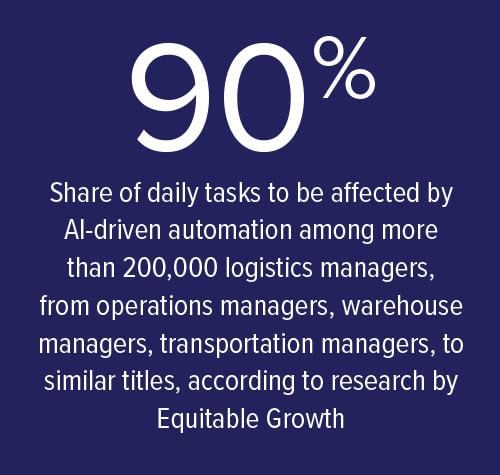Up in the Air? The Future of the Supply Chain Manager Role

Tracking down lost shipments, chasing carriers for updates, and piecing together visibility from spreadsheets, emails, and phone calls—these are the tasks supply chain managers juggle every day. Artificial intelligence reshuffles them all.
Reactive to Proactive
The job is evolving from a primarily reactive role to a proactive and strategic one. Managers will spend less time chasing down issues and more time shaping resilient, customer-centric supply chains.
Data Collector to Decision-Maker
 Much of a manager’s time is typically consumed with gathering information—ETAs, rate tables, inventory counts, etc., often across disconnected systems from email to paper trails and multiple vendors and systems. AI will be able to consolidate, analyze, and forecast all of that in real time. The manager’s value won’t be finding data; it will be interpreting it and deciding how to act on it.
Much of a manager’s time is typically consumed with gathering information—ETAs, rate tables, inventory counts, etc., often across disconnected systems from email to paper trails and multiple vendors and systems. AI will be able to consolidate, analyze, and forecast all of that in real time. The manager’s value won’t be finding data; it will be interpreting it and deciding how to act on it.
Firefighter to Orchestrator
Instead of being stuck in reaction mode, managers will increasingly orchestrate operations from a higher vantage point. With simulation engines and duplicative systems, AI can flag risks before they happen and automate routine responses. That frees up managers to focus on exceptions that require human judgment and to design workflows that prevent recurring issues altogether.
Cost-Cutter to Value Builder
The supply chain manager of the future will be measured by more than just efficiency. They’ll be expected to weigh brand reputation, sustainability, labor practices, and customer trust in their decisions. That makes their role more strategic and focused on building long-term value rather than securing short-term savings.

THE BOTTOM LINE: With AI automating repetitive tasks, expect higher-order work: problem-solving, strategy, and leadership. The future supply chain manager is a strategist, a customer advocate, and a builder of resilient networks.
Source: Troy Lester, CRO and Co-Founder, Warp
